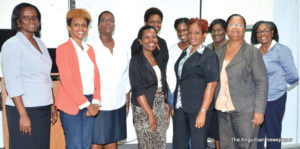
A working document, which may be called an Early Childhood Baby Snapshot, relating to young children in Anguilla, is being undertaken by a UNICEF consultant and education officials on the island.
They have been meeting in a workshop on the matter at the Anguilla Community College. Ms. Nicole Hazell, a Monitoring and Evaluation Consultant, has been contracted by UNICEF, Eastern Caribbean, to work with colleagues in the Ministry and Department of Education in Anguilla on the production of what would be a policy document with a set of guidelines.
“What this basically means is that we are looking at data specific to children from birth to five years as it relates to access to education and early childhood services, health needs, and utilisation of services by children within that same age group,” she told The Anguillian. “We are also looking at financing of early childhood education services and other general areas related to children. At the end of this exercise, we are going to produce a document that highlights data related to children, as I said from birth to five years old, within Anguilla in terms of what is happening as it relates to children within that particular age group.”
Questioned further about the application of the data document, Ms. Hazell stated: “I see it as an initiative that UNICEF, Eastern Caribbean, is doing with the UK Government’s Department for International Department and going forward as something that the Department of Education can do as an annual exercise. That is because it really highlights what is happening with children and provides an accurate picture of the situation. This would really assist in planning not only for education, but in terms of health, social services, and other needs of children within the early years.”
Mrs. Chanelle Petty Barrett, Permanent Secretary, Education, provided further enlightenment on the matter. “This is a project that is supported by UNICEF in all the Overseas Territories,” she explained. “It is a component of the UNICEF Multi-Country Action Plan which seeks to support several countries across the region in relation to strengthening data systems.”
The Permanent Secretary continued: “We actually have a broader system on-going, with the support of UNICEF, in relation to establishing an education and training statistics framework – and this fits in with the overall programme we are working on. But we have recognised that there are some gaps in terms of early childhood education in relation to our ability to monitor, in particular, the age group zero to 2 where most of that component of children is in home-based settings rather than in established day-care centres. That poses an on-going challenge and is actually monitored by the Department of Social Development. But we recognise the need for it to be an Education Department responsibility. However, due to our current human resource constraints, we have not yet transferred responsibility for that to education.”
The Permanent Secretary further said: “Early Childhood Education, as everybody already knows, is really the foundation of life-long learning so we have to put as much emphasis as we can on that component. Even though all of the centres are privately-owned, we still as the government have to provide the level of support necessary to ensure that they meet a certain standard. That will even make our jobs a little easier, when the students enter primary school and secondary school, given that we are responsible for the public system as well.”








